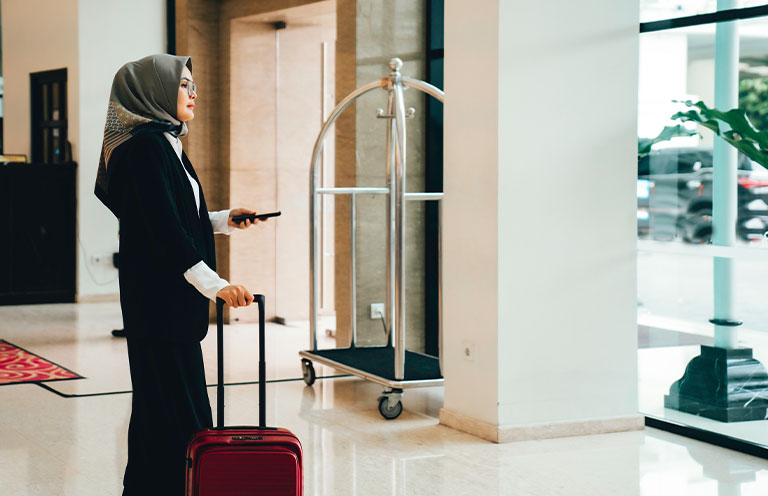
You’ve made your reservation, packed your bags, and finally arrived at the hotel check-in counter—only to hear these five dreaded words: “Sorry, we’re all booked up.”
It might feel like a mistake, but hotel overbooking is actually a deliberate—and surprisingly common—business strategy.
The good news? There’s no need to panic. Understanding the reasoning behind hotel overbooking can give you an edge, whether you’re planning a quick business trip or a family vacation.
Let’s explore the ins and outs of overbooking and share tips for handling this travel hiccup as smoothly as possible.

Why do hotels oversell rooms?
The simple reason: Not every guest shows up. Between late cancellations, no-shows, and early checkouts, a hotel’s reservation log rarely reflects actual occupancy. To stay profitable and keep rooms filled, hotels routinely overbook by a calculated margin—much like airlines do with flights.
By analyzing historical booking data, seasonal trends, and location-specific factors, hotels can estimate how many guests are likely to cancel or not show up on a given date. They then oversell just enough to hedge their bets—ideally without inconveniencing guests.
Is it legal for hotels to sell more inventory than they have?
Yes. In fact, hotel overbooking is a long-standing and widely accepted practice—not just for hotels, but for airlines and car rental companies, too.
That said, hotels are expected to “walk” guests—meaning they must relocate them to a comparable property at no additional charge. The best hotels do this quickly and with minimal disruption, often going above and beyond to make things right.
"In most cases, elite members and frequent guests receive the highest priority and are less likely to be relocated."
How do hotels decide which guests to relocate?
Hotels don’t walk guests at random; the decision is based on factors such as loyalty status, booking method, check-in time, and length of stay. In most cases, elite members and frequent guests receive the highest priority and are less likely to be relocated.
So, while a confirmed reservation typically means a room is waiting, there are exceptions—especially when a hotel is nearing full capacity.

What happens if you’re turned away?
Being walked isn’t ideal, but most major hotel chains have protocols in place to ease the burden of relocating. At a minimum, your hotel should take these steps if relocation becomes necessary:
- Secure nearby accommodations of equal or better quality.
- Cover any difference in room rate or other incurred expenses.
- Provide transportation to the new location.
Some hotels go a step further to retain your business, offering perks such as bonus loyalty points, food-and-beverage credits, and vouchers for future stays. If there’s no mention of additional compensation, it never hurts to ask.

What if there’s no alternative option?
If your hotel is unable—or unwilling—to provide a satisfactory solution, there are several ways to advocate for yourself.
-
Communicate your concerns to the hotel manager.
Set clear expectations for how you’d like the issue to be resolved. -
Document everything.
Obtain the names and titles of staff you speak with, receipts, confirmation emails, and any written correspondence.
-
Check your coverage.
If you purchased travel insurance (such as through AAA or a credit card benefit), you may be eligible for reimbursement of out-of-pocket expenses. -
Ask for a written confirmation that the hotel was unable to accommodate you.
This may be required for claims or formal complaints.
-
Report the incident, if necessary.
If the issue remains unresolved, consider filing a complaint with the Better Business Bureau, the Federal Trade Commission, or your state’s consumer protection agency.

How can you limit your risk?
While there’s no guaranteed way to avoid overbooking, these four strategies can help.
Book direct.
Make your reservation via the hotel’s site or a trusted travel agency such as AAA Travel, rather than using third-party booking sites of strictly online companies. Direct bookings often receive higher priority and more flexible cancellation policies.
Join hotel loyalty programs.
Even basic membership can improve your standing and reduce the likelihood of being walked.
Check in early.
Arriving earlier in the day lowers the risk of your room being reassigned.
Confirm your reservation.
Call the hotel at least 24 hours in advance to confirm your booking and share your expected arrival time.
. . . . .
Hotel overbooking might feel like poor planning in the moment, but it’s typically a calculated business decision to manage no-shows and maximize occupancy. With a little preparation—including the support that comes with staying at trusted hotel partners recommended by AAA—you’ll be better equipped to navigate the occasional travel hiccup and stay focused on enjoying your trip.

